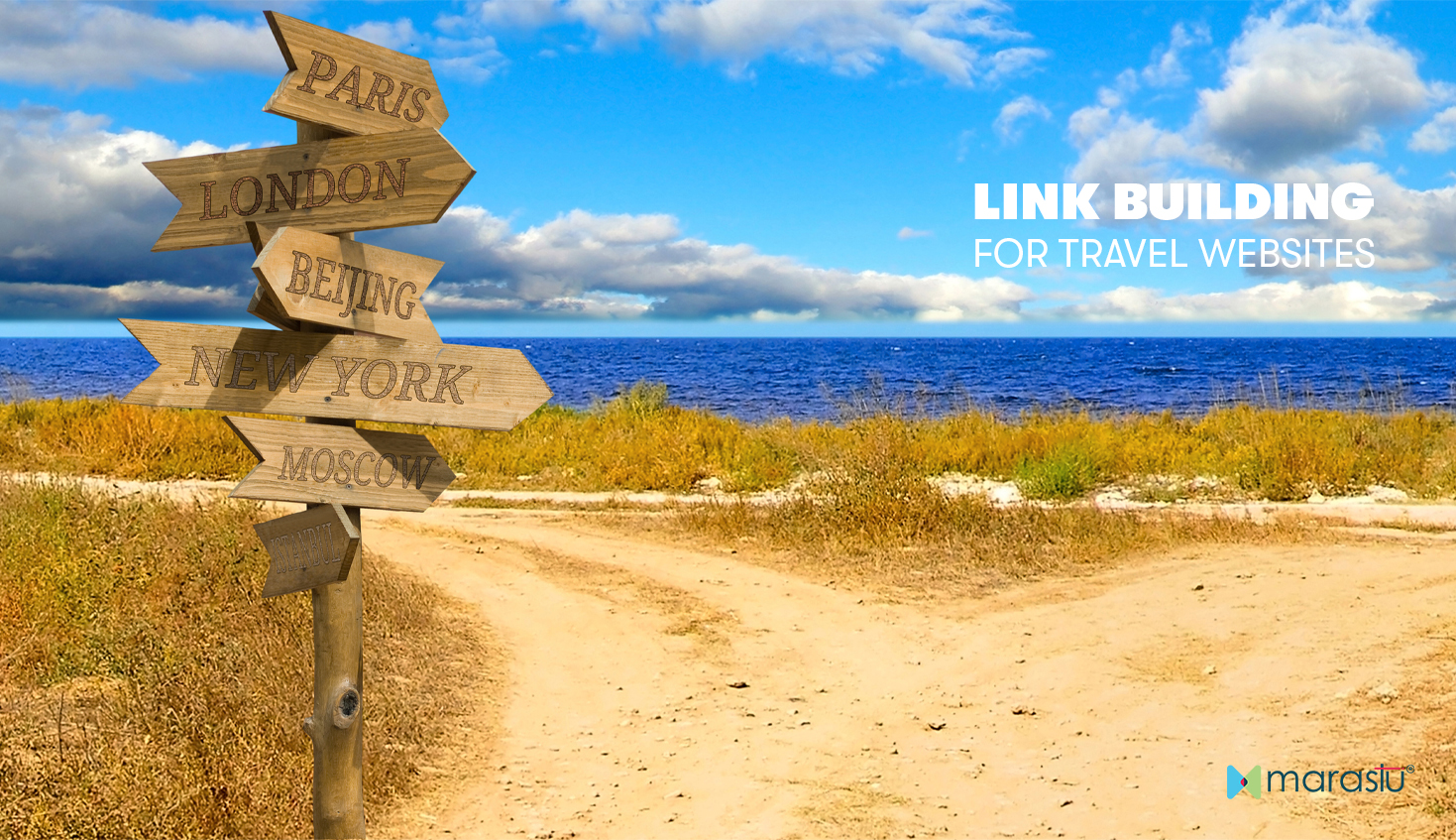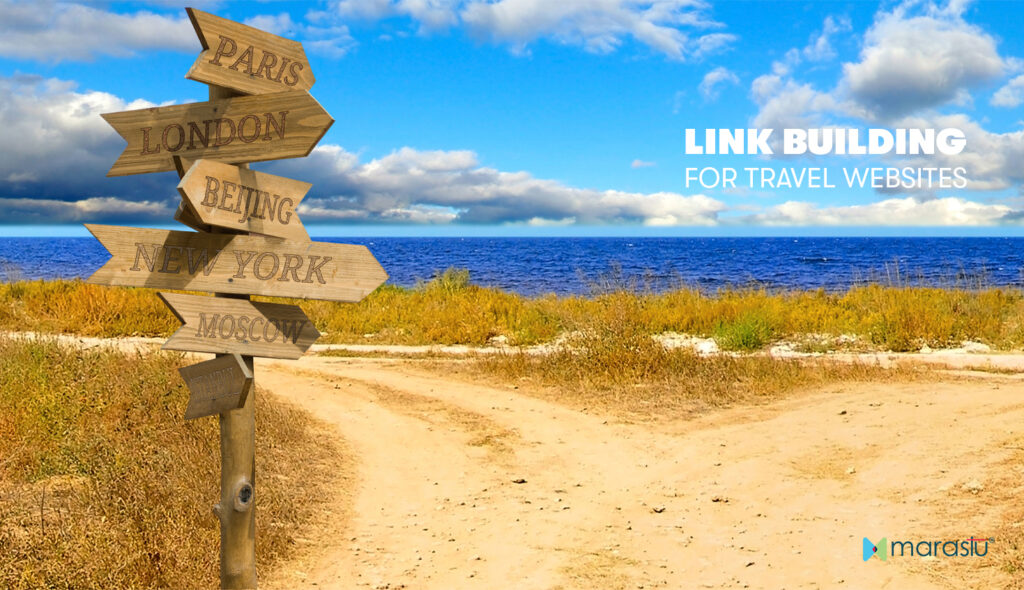Backlinks are essential for search engine optimization (SEO) and ranking on the search engine results pages. When other websites link back to your website, these are called backlinks.
Quality is more important than quantity when it comes to backlinks. Therefore, it is vital that you focus on acquiring high-quality backlinks from respected sites in your niche. These have greater SEO value and will greatly increase your visibility.
Getting relevant and authoritative links from reputable sources increases your site’s credibility with search engines, leading to better organic traffic.
Why Link Building for Travel Websites?
Due to the huge online environment, travel websites must find a way to stand out from their competitors and attract visitors steadily. This is why when someone mentions link building, it refers to getting links from one website and adding them to another.
Travel link building means acquiring backlinks from connected and reliable sources within the tourism sector. These hyperlinks work as votes of confidence to search engines, indicating trustworthiness and authority and, hence, higher rankings in their searches.
The importance of link building for travel websites must be considered. Doing so contributes not only to driving organic traffic but also enhances overall performance concerning SEO while link building for travel websites.
You can optimise your online presence with insights on the importance of link building for travel websites. This strategy will thus attract many visitors who might be interested in whatever your business has been selling across all media channels.
Generating Quality Backlinks
This is essential if successful SEO is expected on any tourist-targeted web page. The more people visit your webpage through hyperlinks, the more popular it becomes since people will refer it to others. This will create traffic, which determines how well your website appears among others and know about its search engine rankings. Here are some tips and tactics on how to build quality backlinks for your tourism website:
Earning Backlinks
Earning backlinks for the travel industry encompasses developing valuable and shareable information that will attract natural links from other reputable sites. When creating quality articles, blog posts, or guides on delightful travel places, tips, or experiences, you are likelier to have many websites referring to your content.
Creating Backlinks
Creating backlinks for tourism industry entails requesting relevant sites to link to your travel website through outreach activities. An example can be writing as a guest on various blogs related to the industry or working out partnerships with travel influencers so that they may refer to or mention the website within their content.
Building Backlinks
Building backlinks for tourism websites is about actively promoting your website’s content across social media platforms, online forums, and niche communities. Sharing insightful information and resources regarding travel on these platforms can make people revisit them, linking them and raising users’ awareness of your site.
However, one thing should be made clear when doing quality travel link building: it is all about relevancy and authority. In turn, this will help engines know how credible you are and aid potential visitors in looking for trusted info by searching.

Strategies of Link Building for Travel Website
Creating High-Quality Content
Providing unique and informational content is critical to travel link building. Travel guides and itineraries that offer a fresh perspective on popular destinations can attract attention from readers and potential travel link building websites.
Another effective way of generating valuable backlinks is to craft engaging blog posts about various destinations and activities. Sharing insider knowledge tips and personal experiences will help you build a trusted source of information in the travel industry.
Conduct thorough research for accurate facts and figures to make your content link-worthy. Additionally, including captivating visuals such as photos or videos can improve your entire content.
One thing to note is that an authoritative online presence demands consistency. This way, your target audiences will consistently benefit from your work while increasing the chances of attracting more opportunities for travel link building for the website with time.
Guest Blogging
Link building for travel industry has led to guest blogging becoming a popular and effective strategy among individuals and businesses wishing to extend their reach. Contributing valuable content to relevant websites related to travel may enhance online visibility and establish you as an authority figure.
Remember that successful guest blogging requires friendships with blog owners or editors. Engage yourself in their work by leaving thoughtful comments or even sharing it on social media platforms to establish rapport with them and improve your chances of being accepted as a guest contributor.
It is possible that guest blogging on an authoritative travel website can boost your online visibility while making you an industry expert. Here, extensive research is recommended. Besides this, build relationships with bloggers whose sites meet your target client base and align with your marketing plans.
Leveraging Social Media
Leveraging social media to generate backlinks has become necessary to increase web traffic and improve search engine rankings.
Sponsored social media posts are one-way social media can be effectively utilized for travel link building. By placing such links in strategic locations within these posts, you could guide visitors to other relevant resources or articles within your blog site. It becomes a win-win situation where the audience gets quality information while at the same time enhancing the visibility and authority of one’s site!
When creating sponsored social media posts with backlinks, ensuring that the content is engaging and relevant to your target audience is crucial. By understanding their interests and pain points, you can tailor the messaging accordingly and entice them to click the provided link.
However, while sponsored social media posts have proven effective in generating backlinks, they should form part of a more comprehensive digital marketing strategy. This method can be combined with other methods of link building for travel websites, such as creating high-quality content, optimizing on-page factors, and building relationships with authoritative websites to achieve more desirable results.
Creating Partnerships with Influencers
Influencer marketing has become a powerful link building strategy for travel websites looking to increase reach and engage with their target audience. These platforms exploit the large following and credibility that comes with famous travel bloggers or social media influencers to promote their brands. This ultimately results in an increased number of visitors who come to see what they are offering. Partnerships with influencers help reach a broader market base.
By collaborating with travel influencers, travel websites can tap into their expertise and authenticity within the industry. These influencers have positioned themselves as authorities, so their recommendations carry an incredible weight among their followers. Travel websites partnering with these individuals leverage the trust that people have developed due to the exposure they got from these influential figures.
They have extensive experience traveling to various places, which allows them to develop attractive and interesting content for their followers. These are the websites or social media channels where this kind of content can be posted to provide valuable insights for travel enthusiasts.
Travel sites must find influencers whose values agree with their brands to establish valuable partnerships with influencers in the travel industry. This ensures the collaboration looks real and resonates well with the influencer’s fans and the website’s target audience.
Travel Directories and Listings
When you submit your website to local directory websites, you can attract visitors who specifically want to explore your location. Such sites often provide tips, advice, and resources for individuals seeking a specific destination. A listing or being featured on these travel directories will focus on those already interested in learning more about the area you serve.
Local travel websites aside, one may consider niche travel directories. These directories deal with adventure tourism, luxury tourism, ecotourism, and other related topics. Submitting your website to these specific audience-based directories helps improve SEO for the travel agency.
However, ensure that your website details remain relevant when submitting them to these directories and listings. Opt for directories that align directly with the subject matter or those custom-made for your target market alone.
Additionally, it is essential to submit your website with accurate and up-to-date information. This includes information such as your business’s address, name and contact details, a description of your services or products, and relevant keywords about travel.
Collaborating with Travel Bloggers and Travel Publications
Many tourists have come to rely on travel bloggers as their most trusted sources of information regarding new destinations. They have a dedicated following of repeat visitors who trust their advice and recommendations. They can help you leverage their followership and expose your destination or product to potential customers.
Similarly, working with travel publications allows you to capitalize on their readership base, which has been around for a long time and has a well-established reputation. Travel magazines like these usually have ardent travelers who follow every piece published for inspiration, tips on traveling, and where to visit next. Placing your content or business in such publications will go a long way toward increasing visibility among people who are genuinely interested in what you do.
Also, ensure that it’s a win-win situation for both parties involved. Provide something valuable, like an exclusive experience at a destination or access to content aligning with readers’ interests. This would make them more likely to partner with you successfully.
When pursuing collaborations with bloggers or publications concerned with travel, it is crucial to seek partners who share similar values. Communication becomes very important when operating together. Clearly state the goals, deliverables, dates, schedules, etc., so that work goes smoothly without friction.

Monitoring and Analyzing Travel Link Building Efforts
Monitoring travel link building is critical for travel agencies’ SEO success. Using analytics from travel link building, one can gain insights into the efficacy of the backlinking campaigns.
Tracking Backlinks
It is essential to track backlinks when running link building efforts for travel industry efforts targeted explicitly at tourism related websites. This entails keeping a record of all websites that link back to your site and understanding how these links contribute to your overall SEO performance. You can easily track and monitor the backlinks pointing at your website using tools like Google Search Console or third-party SEO software.
Quality and Relevance of Backlinks
Link quality varies; thus, evaluating its impact on search engine rankings is crucial. Quality refers to the authority or trustworthiness of the linking domain, while relevance suggests how similar the content on the linked page is to yours.
Metrics like domain authority, page authority, trust flow, or citation flow can be used to measure link quality. These metrics represent the influence a site or webpage has in passing ranking power through its links.
Also, for link relevance assessment, you need to analyze whether the linking page’s content matches yours thematically. A relevant backlink from an industry-leading source carries more weight than a generic or unrelated one.
The Do’s and Don’ts
With travel link building, it is necessary to use ethical approaches while avoiding black hat SEO techniques. Relevant and high-quality inbound links can significantly enhance a travel website’s Google rankings and overall prestige. However, you should be aware of some do’s and don’ts.
Do’s
Focus on creating valuable content. Producing high-quality, informative content attracts backlinks from other reputable sites within the tourism sector.
Build relationships with other travel sites: Collaborate with influencers, bloggers, and industry gurus for top-notch organic backlinks through guest posting or partnerships.
Use social media platforms: Use social media channels to promote your content and boost visibility, thereby creating more natural backlinks.
Track your backlink profile: Frequently examine the sources of your backlinks to ensure they are authoritative within the travel niche.
Don’ts
Engage in link schemes or buy links: Avoid participating in schemes offering paid links or promising rapid results with manipulative tactics. Search engines penalize such practices.
Use irrelevant or low-quality backlinks: All websites linking to your travel site must be relevant to your niche and provide valuable information for its users.
Engage in excessive reciprocal linking: Exchanging links with multiple websites solely to boost rankings is considered a black hat technique and should be avoided.
With these link building tips for travel websites, one can establish a solid online presence while maintaining ethical conduct. This will help improve travel agency SEO performance and user experience.
A Long Term Strategy
Link building for travel websites is an important long-term strategy for enhancing search engine ranking positions and attracting organic traffic. Compared to other digital marketing techniques, which may have short-run results, travel link building requires continuous efforts and consistency. Link building for tourism industry should be an ongoing process since search engines consistently update their algorithms.
It is crucial to continuously reach out to relevant websites while acquiring high-quality backlinks relevant to the travel industry. This establishes credibility, authority, and visibility on any website from all search engine pages it appears in.
Consider partnering with Marastu®, which specializes in developing comprehensive link-building strategies. This strategy will help you align with your target audience and travel niche, ensuring your website stays visible and attracts qualified leads.
Let’s Ponder! Let‘s Marastu®
Frequently Asked Questions (FAQs)
What is link building, and why is it important for a travel website?
Simply put, hyperlinks leading from other sites toward yours represent link building. It is very significant in improving the visibility and authority of travel websites in search engine rankings. Ultimately, with travel link building, websites have more online presence, gain organic traffic, and get more bookings or conversions.
How can I find related websites for link building in the travel industry?
Finding relevant websites for link building in the travel industry involves researching search engines and online directories, looking for reputable tourism boards, travel blogs, and influencers, and working with other businesses within the same sector.
What are the dangers associated with link building for travel websites?
Link building for tourism industry can increase visibility, but buying links or using manipulative schemes can lead to penalties and harm your website’s reputation. Focus on getting high-quality organic links from relevant sources.
When do you start seeing results after travel link building efforts?
It will take time before any results appear from your linking efforts since search engines need to evaluate new backlinks. It may take months before rankings and traffic noticeably change. A long-term perspective is important in a successful link-building strategy for a travel website.






